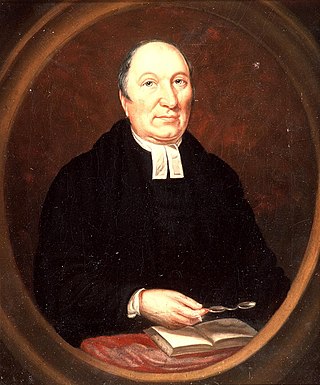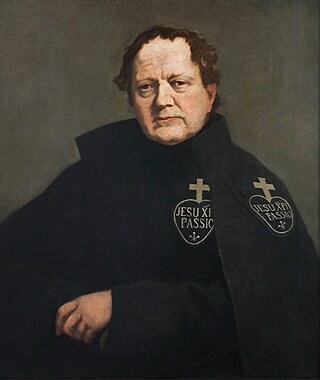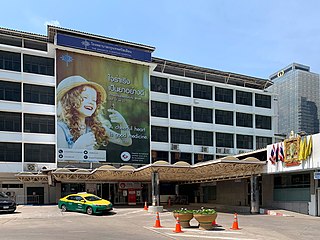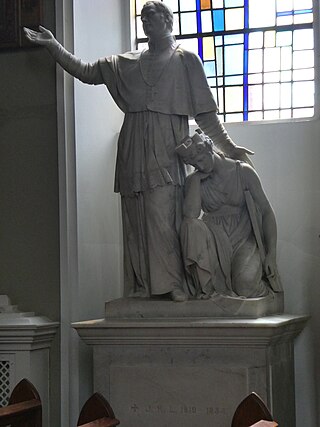Related Research Articles
Evangelicalism, also called evangelical Christianity or evangelical Protestantism, is a worldwide interdenominational movement within Protestant Christianity that puts primary emphasis on evangelization. The word evangelic comes from the Greek word for 'good news'. The Gospel story of the salvation from sin is considered "the good news". The process of personal conversion involves complete surrender to Jesus Christ. The conversion process is authoritatively guided by the Bible, the God in Christianity's revelation to humanity. Critics of the conceptualization of evangelicalism argue that it is too broad, too diverse, or too ill-defined to be adequately seen as a movement or a single movement.
Methodism, also called the Methodist movement, is a Protestant Christian tradition whose origins, doctrine and practice derive from the life and teachings of John Wesley. George Whitefield and John's brother Charles Wesley were also significant early leaders in the movement. They were named Methodists for "the methodical way in which they carried out their Christian faith". Methodism originated as a revival movement within Anglicanism with roots in the Church of England in the 18th century and became a separate denomination after Wesley's death. The movement spread throughout the British Empire, the United States and beyond because of vigorous missionary work, and today has about 80 million adherents worldwide.
The Irish Church Missions (ICM) is a conservative and semi-autonomous Anglican mission. It was founded in 1849 as The Irish Church Missions to the Roman Catholics chiefly by English Anglicans though with the backing and support of Church of Ireland clergy and bishops, with the aim of converting the Roman Catholics of Ireland to Protestantism. The reference to Roman Catholics in the title was removed in 2001.

Thomas Charles was a Welsh Calvinistic Methodist clergyman of considerable importance in the history of modern Wales.

Quakers are people who belong to the Religious Society of Friends, a historically Protestant Christian set of denominations. Members refer to each other as Friends after John 15:14 in the Bible, and originally, others referred to them as Quakers because the founder of the movement, George Fox, told a judge to quake "before the authority of God". The Friends are generally united by a belief in each human's ability to be guided by the inward light to "make the witness of God" known to everyone. Quakers have traditionally professed a priesthood of all believers inspired by the First Epistle of Peter. They include those with evangelical, holiness, liberal, and traditional Quaker understandings of Christianity, as well as Nontheist Quakers. To differing extents, the Friends avoid creeds and hierarchical structures. In 2017, there were an estimated 377,557 adult Quakers, 49% of them in Africa followed by 22% in North America.

Ignatius of St Paul, born as George Spencer, was a son of the 2nd Earl Spencer. He converted from Anglicanism to the Roman Catholic Church and entered the Passionist religious order in 1847 and spent his life working for the conversion of England to the Catholic faith. He was declared Venerable by Pope Francis on 20 February 2021.

It was believed by some scholars that Christianity was first introduced to Thailand by European missionaries. By 2021, there were nearly 1 million Christians in Thailand and represented 1.4% of the predominantly Buddhist national population. Christians are numerically and organizationally concentrated in northern Thailand, where they make up an estimated 16% of the population in some lowland districts and up to very high percentages in tribal districts.

James Warren Doyle, OESA (1786–1834) was a Roman Catholic Bishop of Kildare and Leighlin in Ireland, who used the signature "JKL", an acronym from "James Kildare and Leighlin." Doyle was active in the Anti-Tithe movement. A campaigner for Catholic Emancipation until it was attained in 1829, he was also an educator, church organiser and the builder of Carlow cathedral.
Lutheranism is a major branch of Protestantism that identifies primarily with the theology of Martin Luther, the 16th-century German monk and reformer whose efforts to reform the theology and practices of the Catholic Church launched the Reformation in 1517. Lutheranism subsequently became the state religion of many parts of Northern Europe, starting with Prussia in 1525.
Owen Connellan was an Irish scholar who translated the Annals of the Four Masters into English in 1846.

Thady Connellan (1780–1854) was an Irish school-teacher, poet and historian.
Henry Joseph Monk Mason was an Irish writer who, although not a native speaker, specialised in Irish-language activities. He was a founder of The Irish Society, dedicated to spreading the Scripture in Irish, and a campaigner for prison reform.
The Irish society for promoting the scriptural education and religious instruction of the Irish-speaking population chiefly through the medium of their own language, sometimes called the Irish Society, was a Protestant missionary society which proselytized among Irish-speaking Roman Catholics. It was founded in 1818 in Dublin by members of the Church of Ireland and remained in existence until 1914.
The Hibernian Bible Society was founded in Dublin, Ireland in 1806, to encourage a wider circulation of the Bible in Ireland. The first meeting was held at the Royal Exchange, Dublin, on 10 November 1806, with Lord Belvedere in the chair.
While the Old Testament portion of the Bible was written in Hebrew and Aramaic, the New Testament was originally written in Koine Greek. The Greek language, however, has several different dialects or denominations. This required several different translations done by several different individuals and groups of people. These translations can be categorized into translations done before and after 1500 AD.
Joseph Henderson Singer (1786–1866) was an Irish Anglican bishop in the Church of Ireland in the 19th century.

THE NATIONAL EVANGELICAL SYNOD OF SYRIA AND LEBANON (NESSL)

The evangelical revival in Scotland was a series of religious movements in Scotland from the eighteenth century, with periodic revivals into the twentieth century. It began in the later 1730s as congregations experienced intense "awakenings" of enthusiasm, renewed commitment and rapid expansion. This was first seen at Easter Ross in the Highlands in 1739 and most famously in the Cambuslang Wark near Glasgow in 1742. Most of the new converts were relatively young and from the lower groups in society. Unlike awakenings elsewhere, the early revival in Scotland did not give rise to a major religious movement, but mainly benefited the secession churches, who had broken away from the Church of Scotland. In the late eighteenth century and early nineteenth century the revival entered a second wave, known in the US as the Second Great Awakening. In Scotland this was reflected in events like the Kilsyth Revival in 1839. The early revival mainly spread in the Central Belt, but it became active in the Highlands and Islands, peaking towards the middle of the nineteenth century. Scotland gained many of the organisations associated with the revival in England, including Sunday Schools, mission schools, ragged schools, Bible societies and improvement classes.

Edward Nangle was a Church of Ireland minister and the founder of the Achill Mission Colony. He established a Protestant mission on Achill Island, County Mayo, in 1834 and worked there for eighteen years with the aim of bringing Protestantism to the Native Irish Christians who were impoverished in large part due to the Penal Law policies of the Protestant Ascendancy. Edward Nangle was involved in evangelical attempts to convert Catholics to Protestantism. He opened a Christian school on the island where children were taught reading, writing, agricultural skills and Christianity as part of a Missionary Colony. His presence on the island led to some press coverage and parliamentary debates. The island itself was developed with a pier built at Dugort, a courthouse at Achill Sound and a road network between numerous key locations on the island. A plaque hanging in St. Thomas Church, Dugort, dedicated to Edward Nangle and erected by friends after his death, reads: "He devoted his life from the year 1834 to the welfare of the people of Achill among whom he lived for many years."
Irish Evangelical Society (IES), was an organisation founded in 1814 to promote the Protestant faith in Ireland. It was initially founded in London. Its aim was to support preachers and priests of the Reformed faith outside the established Church of Ireland. It was supported by a number of Evangelical members of the Church of Ireland, as well as members of the society in England. As a result, it supported Independent Ministers, priests and Chapels. It became closely aligned to the Congregationalists, and was pretty much absorbed by Congregational Union of Ireland by 1899.
References
- ↑ A brief view of the London Hibernian Society for establishing schools and circulating the Holy Scriptures in Ireland , The London Hibernian Society, 1837.
- ↑ The End of Kildare Place by T. Corcoran, The Irish Monthly , Nov., 1932, Vol. 60, No. 713 (Nov., 1932), pp. 649-653.
- ↑ London Hibernian Society, The Oxford Companion to Irish History.
- ↑ Thady Connellan Dictionary of Irish Biography